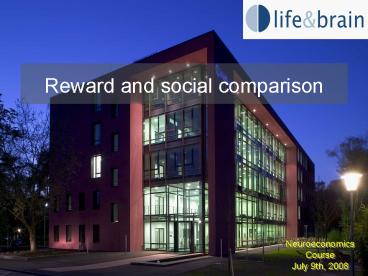Kein Folientitel
1 / 35
Title:
Kein Folientitel
Description:
Midbrain: Ventral Tegmental Area (VTA) and Substantia Nigra ... BOLD responses reflecting dopaminergic signals in the human ventral tegmental area. ... –
Number of Views:84
Avg rating:3.0/5.0
Title: Kein Folientitel
1
Reward and social comparison
Neuroeconomics Course July 9th, 2008
2
Unfair payment today
3
and in the past
4
And in other species
Nature, 425 18. September 2003
5
Experimental setting
6
Task
7
(No Transcript)
8
35
mehr
weniger
9
120 Euro
35
60 Euro
mehr
weniger
10
Experimental design
11
ROI-Definition
1. Occipital lobes 2. Precuneus 3. Gyrus
angularis bil. 4. Ventral Striatum 5. Medial
Orbitofrontal Cortex
From Science, 318 23. November 2007
12
Results ROI-Analysis
From Science, 318 23. November 2007
13
Results ROI Analysis
From Science, 318 23. November 2007
14
Results Whole Brain Analysis
From Science, 318 23. November 2007
15
Main points
Brain activity in the ventral striatum is
strongly influenced by the reward level relative
to others There is no evidence for the involment
of other brain regions in this comparison
process, especially not of those involved in
social cognition (medial and dorsolateral
prefrontal cortices). The ventral striatum is
able to immedeatly integrate contextual
information But What about women? What do
these activations tell us about individuals?
16
Gender, pleasantness and the ventral striatum
?
?
17
Gender, pleasantness and the medial prefrontal
cortex
?
?
18
Main points
- In the VS, women do not react differently to
social reward differences than men, i.e. the
higher the relation of ones own reward to that
of another person, the higher the activation - The VS response predicts pleasantness ratings of
social differences as well as (un-)cooperativeness
and negative reciprocity - Women exhibit stronger responses of the arMPC to
(undeserved) higher own rewards than men. - This region modifies pleasantness ratings
- Women excert stronger control over impulses
generated in the VS - But
- Is the association VS activity and
ratings/personality bottom-up or top-down?
19
Part 2 The dopaminergic reward system and
learning
Neuroeconomics Course July 9th, 2008
20
What is reward?
Reward Positive Reinforcer Primary rewards
Secondary rewards
21
Functions of reward
www.scholarpedia.com ? Reward signals by
Wolfram Schultz
Reward induces Learning Approach
Behavior Hedonic (positive) feelings
22
Intracerebral Self-Stimulation
Positive Reinforcement Produced by Electrical
Stimulation of Septal Area and Other Regions of
Rat Brain (1954) By JAMES OLDS AND PETER MILNER
23
The reward system
Midbrain Ventral Tegmental Area (VTA) and
Substantia Nigra Basal Ganglia Ventral
Striatum/Nucleus accumbens Orbitofrontal
Cortex Transmitter Dopamine
24
Clinical condtions related to Dopamine
Reduced Dopamine Parkinsons disease
25
Clinical condtions related to Dopamine
Increased Dopamine Activity Schizophrenia
26
The reward system findings from animal studies
?
27
Kamin Blocking and reward prediction error
?V a ß (?-V(sum)) Reward prediction error
Rescorla-Wagner-Modell
28
Findings in the human ventral striatum
29
Findings in the human ventral striatum
Functional imaging of neural responses to
expectancy and experience of monetary gains and
losses. Breiter HC, Aharon I, Kahneman D, Dale
A, Shizgal P. Neuron. 2001 May30(2)619-39.
30
Findings in the human ventral striatum
Er v 59 Euro Du v 121 Euro
24 Weniger Mehr
31
Findings in the human midbrain
BOLD responses reflecting dopaminergic signals in
the human ventral tegmental area. D'Ardenne K,
McClure SM, Nystrom LE, Cohen JD. Science.
2008319(5867)1264-7.
32
Dopamine Genetics and Reward learning
Genetically determined differences in learning
from errors. Klein TA, Neumann J, Reuter M,
Hennig J, von Cramon DY, Ullsperger M. Science.
2007 Dec 7318(5856)1642-5.
33
Parkinsons Disease and Reward learning
By carrot or by stick cognitive reinforcement
learning in parkinsonism. Frank MJ, Seeberger
LC, O'reilly RC. Science. 2004 Dec
10306(5703)1940-3.
34
Gene by Drug Interactions and Reward learning
Dopamine gene predicts the brain's response to
dopaminergic drug. Cohen MX, Krohn-Grimberghe A,
Elger CE, Weber B. Eur J Neurosci. 2007
Dec26(12)3652-60.
35
Main points
- The structures most relevant to reward processing
are located in the midbrain (VTA, Substantia
nigra), the ventral striatum (nucleus accumbans),
and the medial orbitofrontal cortex - The predominant neurotransmitter here is dopamine
- In the VTA and VS of both animals and humans
reward prediction errors are signaled. - These signals are important for reinforcment
learning and can be modified by genetic
polymorphism, diseases and drugs that affect this
system































